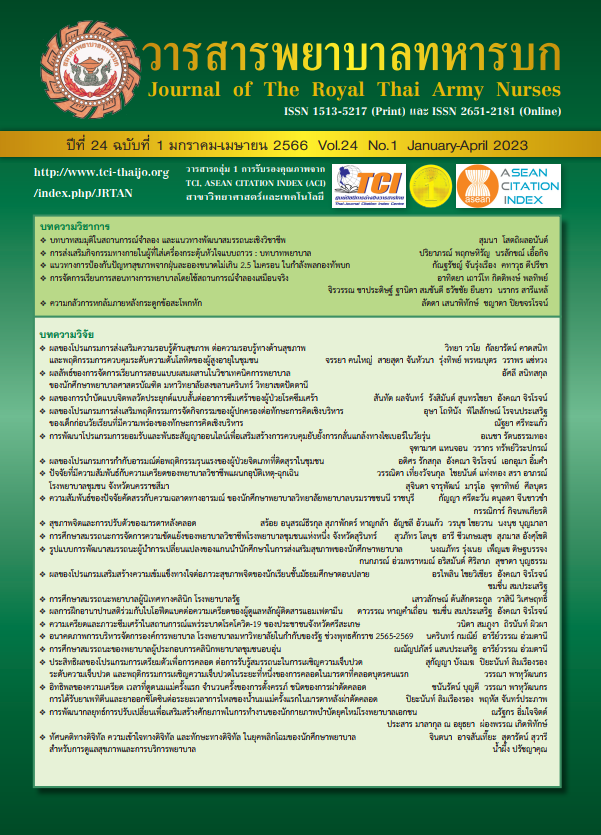The Effects of Anapanasati with Biofeedback on The Stress of Amphetamine Patiens’ Primary Caregivers
The Effects of Anapanasati with Biofeedback on The Stress of Amphetamine Patiens’ Primary Caregivers.
Keywords:
Ānāpānasati with biofeedback program, primary caregivers of amphetamine addicts, stress managementAbstract
The purpose of this Quasi-experimental research was to determine the effects of Ānāpānasati with biofeedback on the stress of amphetamine patients’ primary caregivers. The sample consisted of 60 caregivers of amphetamine patients, recruited using the inclusion criteria. They were randomly assigned to the control and experimental groups, with 30 subjects in each group. The experimental group received the Ānāpānasati with biofeedback created by the researchers. It consisted of eight sessions 90 minutes each, one time per week, for a total of eight weeks. The control group received routine caring activities. The research instruments were the following: 1) a general information questionnaire; 2) Ānāpānasati with biofeedback validated for content by three qualified persons; and 3) the Thai Stress Test (TST), which examined the questionnaire’s reliability, with a Cronbach’s alpha coefficient of .84. The demographics were analyzed using descriptive statistics. A comparison of the mean negative and positive stress scores of the primary caregivers of amphetamine addicts between the pretest and posttest for the experimental group was analyzed using dependent t-test. Further, an independent t-test was used to examine the mean difference in the negative and positive mean scores for the pretest and posttest for the experimental and control group.
The results of the findings were as follows:
1) The experimental group participants had a lower post-experimental negative stress mean score (M=13.43, SD=1.96) than the pre-experimental negative stress mean score (M=21.27, SD=4.23), which was statistically significant (t=8.95, p<.001).
After the experiment, it was found that the experimental group had a statistically significantl higher positive stress mean score (M=22.70, SD=2.55) than before the experiment at (M=11.33, SD=5.77) and (t =11.05, p<.001) respectively.
2) The mean difference of negative stress mean score in the caregivers of amphetamine addicts between the pretest and posttest of the experimental group that participated in the Ānāpānasati with biofeedback program (=7.84, SD=4.80) were significantly greater than the mean difference of negative stress mean score of the control group that received routine caring activities (=0.27, SD=0.91) (t=8.50, p<.001), and the mean difference of positive stress mean score in the caregivers of amphetamine addicts between the pretest and posttest of the experimental group (3=11.37, SD=5.61) was significantly greater than that of the control group that received routine caring activities (4=0.03, SD=1.07) (t=10.83, p<.001).
As a result of this study, it can be concluded that the Ānāpānasati with biofeedback can reduce stress in primary caregivers of amphetamine patients.
Downloads
References
Heikkilä H, Maalouf W, Campello G. The United Nations Office on Drugs and Crime’s Efforts to Strengthen a Culture of Prevention in Low-and Middle-Income Countries. Prevention Science. 2021; 22(1): 18-28. (in Thai).
Ritmoontree S, Fatigue and mental health of primary caregivers of methamphetamine addicts receiving services at Thanyarak Hospital. Department of Medical Services. Ministry of Public Health; 2013. (in Thai).
Wongpanarak N, The Role of the Nurse in Addiction Counseling. Journal of the Royal Thai Army Nurses. 2019; 19(1): 16-23. (in Thai).
Jaroensan J. Effects of Using Clinical Nursing Pracetice Guideline in Caring for Schizophrenia Patients with Substance Dependence on Caregivers’ Capabilities and Burden, and Patients’ Relapse rate and Substance use. Journal of Psychiatric Nursing and Mental Health. 2014;28(2): 46-60. (in Thai).
Yamma W, The Effect of Mediation Program on Emotion Quotient of the First Year Nursing Students in Phetchaburi Rajabhat University. Journal of the Royal Thai Army Nurses. 2020; 22(1): 156-65. (in Thai).
Thongkum K, The Effect of Meditation Training Together with a Biofeedback Training Program on The Stress Levels of Chronic Disease Patients: Thesis of Master Nursing Science in Mental health and Psychiatric at Thammasat University; 2012. (in Thai).
Selye H. The Stress of Life. NewYork : Mc.Graw, Prentice Hall; 1956.
Venerable Phra Brahmagunabhorn (P.A. Payutto). Buddha-Dharma (Extended Edition). Bangkok: Sahathammik; 2016. (in Thai).
Ruchiwit M. Stress management for promoting mental health. Pathumthani: Thammasat University Press. 2013. (in Thai).
Phattharayuttawat S, Thai Stress Test (TST). Journal of Psychiatric Association of Thailand. 2000; 45(3) : 237-50. (in Thai).
Lertsakornsiri M. The effectiveness of meditation program toward multipleintelligencesamong the first year students at Saint Louis College. Journal of The Royal Thai Army Nurses. 2016; 17(3): 44-53. (in Thai)
Lazarus, R. S., & Folkman, S. Stress, appraisal, and coping. New York: Springer;1984
Downloads
Published
How to Cite
Issue
Section
License
Copyright (c) 2023 Journal of The Royal Thai Army Nurses

This work is licensed under a Creative Commons Attribution-NonCommercial-NoDerivatives 4.0 International License.
บทความหรือข้อคิดเห็นใดใดที่ปรากฏในวารสารพยาบาลทหารบกเป็นวรรณกรรมของผู้เขียน ซึ่งบรรณาธิการหรือสมาคมพยาบาลทหารบก ไม่จำเป็นต้องเห็นด้วย
บทความที่ได้รับการตีพิมพ์เป็นลิขสิทธิ์ของวารสารพยาบาลทหารบก
The ideas and opinions expressed in the Journal of The Royal Thai Army Nurses are those of the authors and not necessarily those
of the editor or Royal Thai Army Nurses Association.






